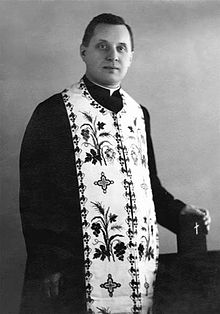Symeon Lukach
Symeon Lukach | |
|---|---|
 | |
| Born | 7 July 1893 Starunya, Kingdom of Galicia and Lodomeria, Austrian-Hungarian Empire |
| Died | 22 August 1964 (aged 71) Starunya, Ukrainian Soviet Socialist Republic, Soviet Union |
| Venerated in | Roman Catholic Church, Ukrainian Catholic Church |
| Beatified | 27 June 2001, Lviv, Ukraine by Pope John Paul II |
| Feast | June 28 |
Symeon Lukach (Ukrainian: Симеон Лукач; 7 July 1893 – 22 August 1964) was a Ukrainian Greek Catholic bishop and martyr.
Lukach was born in the village of Starunya, Stanislaviv Region. His parents were peasant farmers.[1] He entered the seminary in 1913. His studies were interrupted for two years during World War I, he finished in 1919.[2] In that year he was ordained a priest by Bishop Hryhory Khomyshyn.[1] He taught moral theology at the seminary in Stanislaviv until April 1945 when Khomyshyn ordained him a bishop.[1][2]
He was first arrested on 26 October 1949 by the NKVD and deported to Siberia (Krasnoyarsk) for ten years hard labor.[2][3] After serving half his sentence, he was released on 11 February 1955.[3] After this, he served as an underground member of the clergy.[1] In July 1962 he was arrested for a second time. He appeared in court with Bishop Ivan Slezyuk who was also an underground bishop.[1] He was sentenced to five more years of labor where he underwent interrogations.[4][5] While he was in prison, he developed tuberculosis.[2] He was released back to his village where he died on 22 August 1964.[3]
He was beatified on 27 June 2001 by Pope John Paul II.[1]
After his first arrest in 1949, Fr Symeon wrote in his autobiography: “I celebrated divine liturgy in an apartment and in a few houses. From one to 30 people took part in the services I also baptized and celebrated marriages But conscience does not allow me to mention their names, so that my mistake will not cause those people who sought spiritual help from me to suffer. I acted in good faith, serving God’s will, so I was in danger of colliding with state laws. If the state finds me guilty, I myself will take the responsibility.”[4][5]
References[edit]
- ^ a b c d e f Biographies of twenty five Greek-Catholic Servants of God at the website of the Vatican
- ^ a b c d Beatification of the Servants of God on June 27, 2001 Archived November 29, 2014, at the Wayback Machine at the website of the Ukrainian Greek Catholic Church
- ^ a b c Alan Butler, Paul Burns. Butler's lives of the saints. Continuum International Publishing Group, 2005. p80
- ^ a b Church of the Martyrs: The New Saints of Ukraine. Publishing Division Svichado. 2004. ISBN 9665613456.
- ^ a b "Faith Amid Hopelessness". The New Martyrs of the Ukrainian Greco-Catholic Church. Saskatoon: Saints Peter & Paul Ukrainian Catholic Church.
- 1893 births
- 1964 deaths
- Clergy from Ivano-Frankivsk Oblast
- Clergy from the Kingdom of Galicia and Lodomeria
- Ukrainian Austro-Hungarians
- Bishops of the Ukrainian Greek Catholic Church
- Eastern Catholic beatified people
- Ukrainian beatified people
- 20th-century Eastern Catholic martyrs
- Beatifications by Pope John Paul II
- 20th-century deaths from tuberculosis
- Tuberculosis deaths in the Soviet Union
- Tuberculosis deaths in Ukraine
- Bishops of the Ukrainian Catholic Archeparchy of Ivano-Frankivsk
- Eastern Catholic bishop stubs
- Ukrainian Greek Catholic Church stubs
